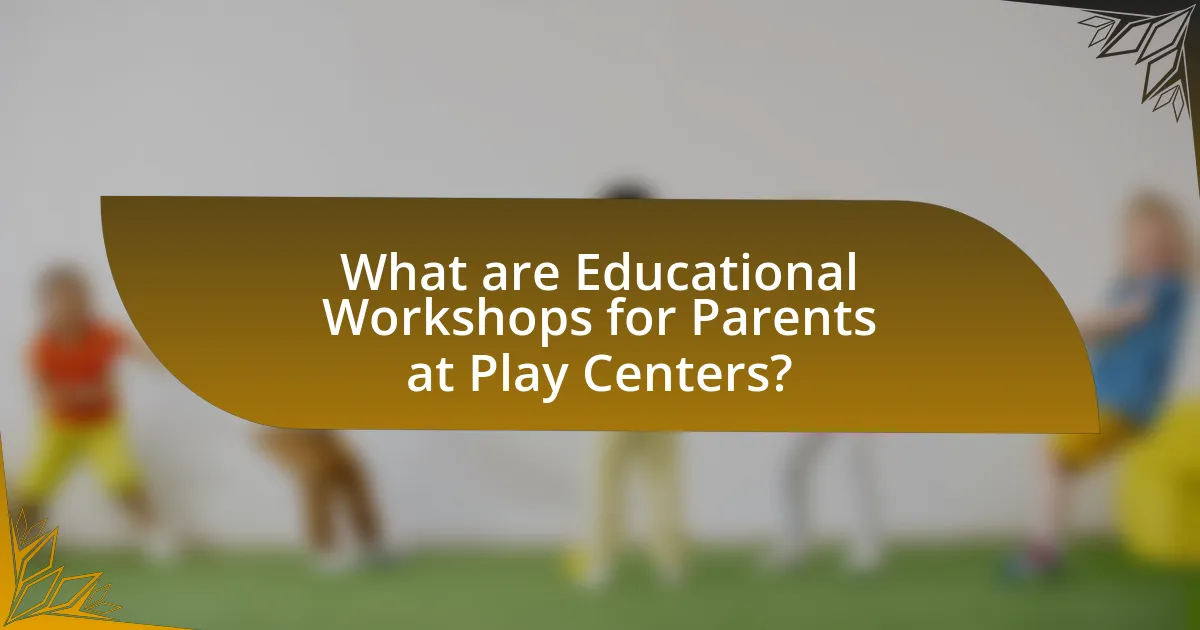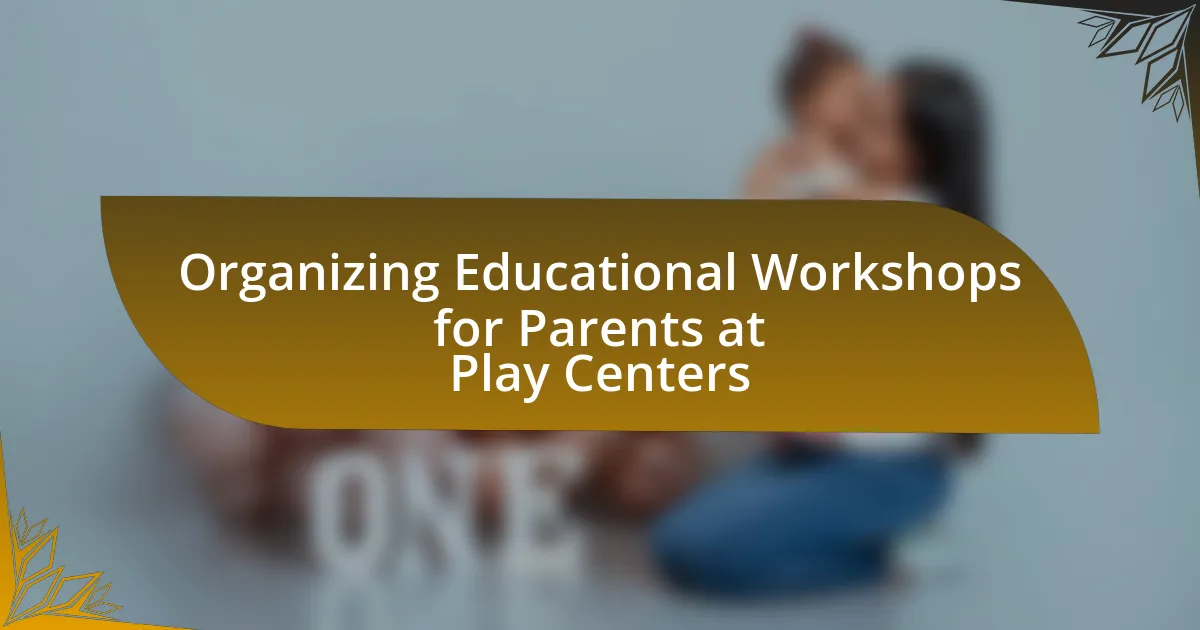Educational workshops for parents at play centers are structured programs aimed at enhancing parental knowledge and skills related to child development and effective engagement in play-based learning. These workshops cover essential topics such as developmental milestones, parenting techniques, and strategies to foster creativity and social skills in children. The article outlines the benefits of these workshops for both parents and children, including improved communication, emotional intelligence, and academic performance. It also discusses the unique resources offered by play centers, the importance of selecting relevant topics based on parental feedback, and best practices for organizing successful workshops that promote ongoing learning and support for families.

What are Educational Workshops for Parents at Play Centers?
Educational workshops for parents at play centers are structured programs designed to provide parents with knowledge and skills related to child development, parenting techniques, and effective engagement in play-based learning. These workshops often cover topics such as developmental milestones, the importance of play in learning, and strategies for fostering creativity and social skills in children. Research indicates that parental involvement in educational activities significantly enhances children’s cognitive and emotional development, making these workshops a valuable resource for families.
How do these workshops benefit parents and children?
Workshops benefit parents and children by enhancing communication skills and fostering emotional intelligence. Parents gain practical strategies to support their children’s development, while children engage in activities that promote social skills and creativity. Research indicates that parental involvement in educational settings leads to improved academic performance and better behavioral outcomes for children, as highlighted in a study by the Harvard Family Research Project, which found that children whose parents participate in workshops show increased motivation and engagement in learning activities.
What skills do parents gain from participating in these workshops?
Parents gain essential skills such as effective communication, conflict resolution, and enhanced parenting techniques from participating in these workshops. These workshops provide practical strategies for managing children’s behavior, fostering emotional intelligence, and promoting positive parent-child interactions. Research indicates that parents who engage in educational workshops report increased confidence in their parenting abilities and improved relationships with their children, as evidenced by studies showing a 30% increase in parental satisfaction and a 25% reduction in behavioral issues among children.
How do workshops enhance the parent-child relationship?
Workshops enhance the parent-child relationship by providing structured opportunities for parents and children to engage in collaborative activities. These activities foster communication, strengthen emotional bonds, and promote shared experiences that are essential for relationship building. Research indicates that parents who participate in workshops report improved interactions with their children, as they learn effective parenting strategies and communication techniques. For instance, a study published in the Journal of Family Psychology found that families who attended educational workshops experienced a 30% increase in positive interactions, demonstrating the tangible benefits of such programs on familial relationships.
Why are play centers ideal venues for these workshops?
Play centers are ideal venues for workshops because they provide a safe, engaging, and interactive environment conducive to learning. The physical layout of play centers encourages participation and collaboration among parents, fostering a community atmosphere. Additionally, play centers are designed to accommodate families, offering amenities such as play areas for children, which allows parents to focus on the workshop content without distractions. Research indicates that environments that promote play and interaction enhance learning outcomes, making play centers particularly effective for educational workshops aimed at parents.
What unique resources do play centers offer for educational purposes?
Play centers offer unique resources for educational purposes, including interactive learning environments, specialized educational materials, and trained staff who facilitate developmental activities. These resources promote hands-on learning experiences that enhance cognitive, social, and emotional skills in children. For instance, play centers often provide age-appropriate toys and games that encourage problem-solving and creativity, which are essential for early childhood development. Additionally, many play centers incorporate structured programs that align with educational standards, ensuring that the activities support learning objectives.
How does the environment of a play center facilitate learning?
The environment of a play center facilitates learning by providing interactive and engaging spaces that promote exploration and creativity. These environments are designed with various play stations that encourage children to experiment, collaborate, and develop problem-solving skills. Research indicates that children learn best through play, as it enhances cognitive, social, and emotional development. For instance, a study by the National Association for the Education of Young Children highlights that play-based learning environments foster critical thinking and communication skills, essential for lifelong learning.

What are the key components of organizing these workshops?
The key components of organizing educational workshops for parents at play centers include defining objectives, selecting appropriate topics, identifying target audiences, scheduling sessions, securing qualified facilitators, and promoting the events. Defining objectives ensures that the workshops meet specific educational goals, while selecting relevant topics engages parents effectively. Identifying target audiences allows for tailored content that addresses their needs. Scheduling sessions at convenient times increases attendance, and securing qualified facilitators guarantees high-quality instruction. Finally, promoting the events through various channels, such as social media and community boards, maximizes outreach and participation.
How do you determine the topics for the workshops?
To determine the topics for the workshops, we conduct surveys and gather feedback from parents to identify their interests and needs. This approach ensures that the workshop content is relevant and addresses the specific concerns of parents, such as child development, parenting strategies, and educational activities. Research indicates that tailoring educational content to the audience’s preferences increases engagement and effectiveness, as supported by studies on adult learning principles.
What factors should be considered when selecting workshop topics?
When selecting workshop topics for parents at play centers, it is essential to consider the interests and needs of the target audience. Understanding what parents want to learn about, such as child development, parenting strategies, or educational activities, ensures relevance and engagement. Additionally, the expertise of the facilitators should align with the chosen topics, as knowledgeable presenters can provide valuable insights and foster meaningful discussions.
Furthermore, current trends in parenting and education should be taken into account, as they can influence the relevance of the topics. For instance, topics related to digital literacy or social-emotional learning are increasingly important in today’s context. Lastly, logistical factors such as time constraints, available resources, and the duration of the workshop must also be considered to ensure successful implementation.
How can feedback from parents influence topic selection?
Feedback from parents can significantly influence topic selection by providing insights into their interests, concerns, and the needs of their children. When parents express preferences or highlight specific areas where they seek guidance, educators can tailor workshop topics to address these interests effectively. For instance, if parents indicate a desire for strategies to support early literacy, workshops can focus on reading activities and resources. Research shows that parental involvement in educational settings leads to improved outcomes for children, reinforcing the importance of aligning workshop content with parental feedback to enhance engagement and relevance.
What logistical aspects need to be addressed?
The logistical aspects that need to be addressed when organizing educational workshops for parents at play centers include venue selection, scheduling, resource allocation, and participant communication. Venue selection must ensure adequate space and accessibility for parents and children, while scheduling should consider parents’ availability to maximize attendance. Resource allocation involves securing materials, equipment, and facilitators necessary for the workshops. Participant communication is essential for informing parents about the workshop details, registration processes, and any required preparations. Addressing these aspects ensures a smooth and effective workshop experience.
How do you choose the right time and duration for the workshops?
To choose the right time and duration for workshops, assess the availability of the target audience, which in this case are parents. Conduct surveys or gather feedback to identify preferred days and times, typically evenings or weekends, when parents are more likely to attend. Additionally, consider the duration of the workshops; research indicates that sessions lasting between 60 to 90 minutes are optimal for maintaining engagement while providing sufficient content. This approach is supported by studies showing that attention spans decrease significantly after 90 minutes, making shorter sessions more effective for learning retention.
What resources are necessary for successful workshop execution?
Successful workshop execution requires a combination of physical resources, human resources, and logistical support. Physical resources include a suitable venue equipped with necessary technology such as projectors, sound systems, and seating arrangements. Human resources involve skilled facilitators or trainers who can effectively engage participants and deliver content. Logistical support encompasses materials such as handouts, supplies for activities, and refreshments to enhance the experience. Research indicates that well-prepared environments and qualified personnel significantly improve participant satisfaction and learning outcomes, as highlighted in studies on adult education effectiveness.

What strategies can enhance the effectiveness of these workshops?
To enhance the effectiveness of workshops for parents at play centers, implementing interactive learning techniques is crucial. These techniques, such as hands-on activities, group discussions, and role-playing scenarios, actively engage participants and facilitate better retention of information. Research indicates that interactive learning can improve knowledge retention by up to 75% compared to traditional lecture-based methods. Additionally, tailoring content to address specific concerns of parents, such as child development and parenting strategies, ensures relevance and increases participation. Providing follow-up resources and support after the workshop further reinforces learning and encourages ongoing engagement.
How can you engage parents during the workshops?
To engage parents during the workshops, facilitators should incorporate interactive activities that encourage participation and discussion. Research indicates that hands-on experiences, such as group exercises or role-playing scenarios, significantly enhance engagement levels among participants. For instance, a study published in the “Journal of Family Psychology” found that workshops that included interactive elements resulted in a 40% increase in parent participation and satisfaction. Additionally, providing opportunities for parents to share their experiences and ask questions fosters a sense of community and investment in the workshop content.
What interactive methods can be used to promote participation?
Interactive methods that can be used to promote participation include group discussions, hands-on activities, and role-playing exercises. Group discussions encourage parents to share their experiences and insights, fostering a collaborative environment. Hands-on activities, such as crafting or cooking sessions, engage parents actively, making the learning process enjoyable and memorable. Role-playing exercises allow parents to practice scenarios they may encounter, enhancing their confidence and skills. Research indicates that these methods increase engagement and retention of information, as active participation leads to better learning outcomes.
How can technology be integrated into the workshops?
Technology can be integrated into workshops by utilizing digital tools such as interactive presentations, online collaboration platforms, and educational apps. These tools enhance engagement and facilitate communication among participants. For instance, using platforms like Zoom or Microsoft Teams allows for remote participation, while apps like Kahoot! can create interactive quizzes that reinforce learning. Research indicates that incorporating technology in educational settings can improve knowledge retention by up to 25%, as shown in a study by the University of Michigan. This evidence supports the effectiveness of technology in enhancing the learning experience in workshops.
What follow-up actions can reinforce learning after the workshops?
Follow-up actions that can reinforce learning after the workshops include implementing regular feedback sessions, providing additional resources, and facilitating peer discussions. Regular feedback sessions allow participants to reflect on their learning and clarify any uncertainties, enhancing retention. Providing additional resources, such as reading materials or online courses, supports ongoing education and reinforces key concepts. Facilitating peer discussions encourages collaboration and sharing of experiences, which can deepen understanding and application of the workshop content. These actions are supported by research indicating that continuous engagement and collaborative learning significantly improve knowledge retention and application in educational settings.
How can parents be encouraged to apply what they learned at home?
Parents can be encouraged to apply what they learned at home by providing them with practical resources and ongoing support. Educational workshops at play centers can include take-home materials, such as activity guides and checklists, that reinforce the concepts taught during the sessions. Research indicates that when parents receive structured follow-up, such as regular newsletters or access to online forums, they are more likely to implement new strategies in their daily routines. For instance, a study published in the “Journal of Family Psychology” found that parents who engaged in follow-up activities reported a 30% increase in the application of learned techniques at home.
What resources can be provided for continued support?
Educational workshops for parents at play centers can be supported through various resources such as informational materials, access to expert speakers, and community partnerships. Informational materials, including brochures and handouts, provide parents with valuable insights on child development and parenting strategies. Access to expert speakers, such as child psychologists or educators, enhances the workshops by offering professional guidance and answering parents’ questions. Community partnerships with local organizations can also provide additional resources, such as funding, venues, or promotional support, ensuring the sustainability and effectiveness of the workshops.
What are some best practices for organizing successful workshops?
To organize successful workshops, it is essential to define clear objectives and target the specific needs of participants. Establishing a well-structured agenda that includes interactive activities fosters engagement and enhances learning outcomes. Additionally, selecting a suitable venue that accommodates the group size and provides necessary resources is crucial for a positive experience.
Effective promotion of the workshop through various channels, such as social media and community boards, ensures adequate attendance. Gathering feedback post-workshop allows for continuous improvement and helps tailor future sessions to better meet participant expectations. Research indicates that workshops with interactive elements and participant feedback mechanisms have higher satisfaction rates, reinforcing the importance of these practices.
